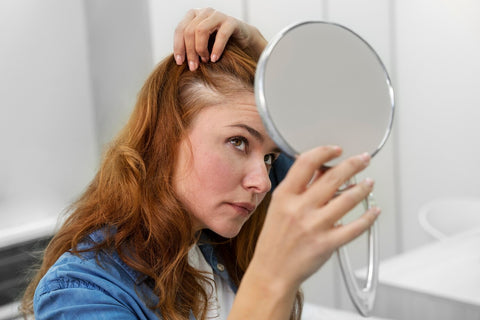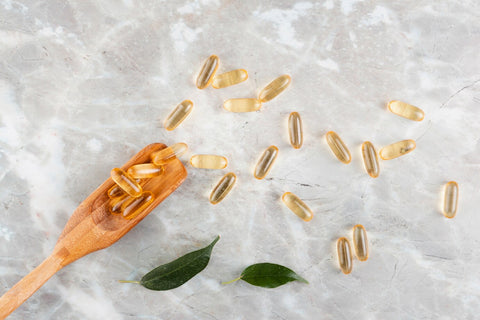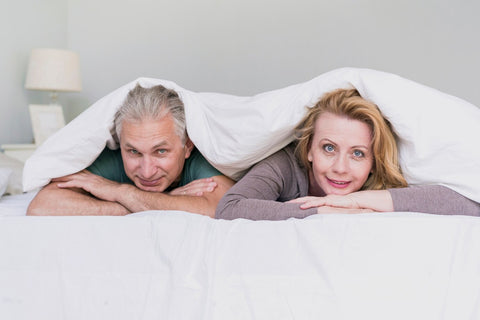Several experts explain what happens to hair during this period and which treatments are most effective.
Although every woman has a different menopause, certain changes are common to all... Salma Hayek explained it when she turned 55 and spoke about the subject with Jada Pinkett-Smith on the talk show Red Table Talk. "The questions that doctors ask you are terrifying. Are your ears and hair growing in them? Are you growing a beard or mustache? Are you irritable? Do you cry for nothing? Are you gaining weight? And, even, is your vagina dry?" said the actress, who recognized that her menopausal symptoms have accompanied her since she was 40, with hot flashes among other problems. Curiously, "you're growing a beard or mustache" often corresponds to the fact that there is a lot of hair where we don't want it and a lack of it where we do like to have it. Because, unfortunately, hair loss can be a consequence of menopause, with hormones as the main culprits.
Knowing how to stop hair loss during menopause is a common question, as hair loss in women over 40 is a common occurrence, and during this stage you may notice that your hair loses volume, thickness, shine and becomes much more fragile.
Throughout life, women experience hormonal changes that affect the functioning of the entire body. Around the age of 50, hormonal changes are accompanied by physical symptoms such as hot flashes, difficulty sleeping, weak bones and hair loss during menopause.
The health of our hair reflects the general state of our body, which is why the hormonal revolution that occurs during menopause has its effects on hair. Even so, hair loss does not always manifest itself as hair loss, but rather a certain loss of density, less thickness and dull or brittle hair can be observed.
How does menopause affect women's hair?
During menopause, the ovaries stop producing estrogen, among other hormones, which is harmful to the hair since estrogen affects the body's ability to produce keratin, a protein essential for hair health, responsible for providing strength, elasticity and shine to the hair.
The hormonal imbalance, in which estrogen levels decrease, causes other hormones such as androgens (including testosterone) to increase proportionally. This explains the changes in hair distribution , which appear in areas where there was none before. In addition, androgens cause hair thinning, known medically as miniaturization, in which the follicles become progressively finer, which encourages hair loss. In general, this type of alopecia affects 15% of women before the age of 40 and almost 40% after the onset of menopause .
If hair loss is persistent, it could be a case of androgenetic alopecia caused by menopause, which is never as drastic as in men . In cases of female alopecia during menopause, the hair does not disappear completely, but the deterioration of the hair is evident, which loses density and vitality.
It is important to know that there are treatments to stop hair loss during menopause. Obviously, after menopause it is impossible to recover the hair of youth since the normal aging process has its effects on the hair follicles.
And what are the symptoms of hair loss during menopause?
There are some signs that indicate the presence of alopecia caused by a lack of estrogen.
The main symptoms of alopecia in menopause are:
- Thinning hair
- Hair loss.
- Dry and brittle hair.
- Dull hair.
- Change in texture.
To stop hair loss during menopause, we recommend applying a treatment that acts internally and externally. That is, complementing a topical treatment combined with a balanced diet that provides the nutrients and vitamins necessary for hair.
Changes in hair routines during menopause
Many women wonder if they should change the type of cosmetics used in their hair routine… well, they must take into account that the characteristics of the hair change, so the choice of hair care products must also be modified. In general, the recommendation is to use more moisturizing products and in most cases we can afford to reduce the frequency of washing, since the scalp will tend to be drier.
However, we will need to intensify the use of conditioners and masks to keep the hair fiber hydrated. We must also keep in mind that gray hair is hair that frizzes more easily and requires specific care.
Some hair care practices damage the hair shaft, for example certain dyes and the use of heat tools. Therefore, it is important to keep in mind that during menopause the hair shaft is more fragile and will have less capacity to repair itself after certain hair care practices. Bleaching and excessive use of heat tools should be avoided, for which we should always apply a heat protector. We should also opt for products with mild ingredients that do not irritate the scalp in women with finer and more fragile hair.
In addition, supplements can help with hair loss by providing essential nutrients that the body needs to keep hair healthy and strong. Among them we can highlight omega 3 that helps reduce inflammation and improve skin hydration. Or resveratrol that acts in a multifactorial way on the skin, reducing inflammation, in addition to increasing collagen levels (a protein that can strengthen hair and improve its elasticity and resistance).
Is hair loss during menopause permanent?
The answer is NO, usually hair loss due to menopause is not permanent, and can be completely reversed only if hormonal imbalances are causing the hair loss.
Therefore, to determine whether hair changes during menopause are permanent or not, a trichologist will need to ask you several questions about your hair loss problem, such as whether there are other factors causing the alopecia, such as poor nutrition or a traumatic or stressful event.
Additionally, you will also be asked about your medical history to determine if you suffer from problems such as anemia, vitamin deficiency, or a skin problem that affects your scalp or the health of your hair.
How do you regain hair lost during menopause?
After 50 years of age and especially during menopause, hair has specific needs that we must be aware of in order to avoid its weakening and subsequent hair loss. For this reason, we give you some advice:
Maintain a balanced diet : Include fruits, vegetables, whole grains, legumes, olive oil, avocado, skimmed dairy products and fish rather than meat.
If you want to take care of your hair during menopause, drink at least a litre and a half of water a day . This will help you hydrate your body, eliminate toxins and improve the appearance of your hair and skin.
In addition, taking Madequa supplements specific to each of the stages of menopause can be a very good option, since it is a set of natural supplements with effective and scientifically supported doses . They contain active ingredients such as Omega 3, Vitamin D, Vitamin K or Resveratrol among others, depending on the pack. If you do not know what stage of menopause you are in, you can take our test and find out which pack would best suit your situation, along with personalized healthy lifestyle guidelines. At Madequa we understand the importance of supplements being adapted to the changing and particular needs that women experience when going through menopause.
Use specific cosmetic products to meet the specific needs of your hair at this stage. The benefits of shampoos with biotin help to stop hair loss during menopause and as a treatment for hair growth.
On the other hand, dyes should be as non-aggressive as possible and, if possible, ammonia-free.
Exercise to combat hair loss during menopause because it increases blood flow and strengthens hair follicles.
Apply hair protection against possible external factors such as sun filters and heat protectors.
Perform a periodic hair exfoliation to remove any dead skin and impurities that may be on the scalp.
What treatments are there for hair loss during menopause?
Hair doctors can advise you on the best treatment for you, as there are some specific treatments to treat alopecia during menopause. These include:
Hair mesotherapy : With vitamins and antiandrogens, capable of blocking the effects of testosterone.
Capillary laser : Stimulates blood flow to the follicles, nourishing the roots and stimulating hair growth.
PRP Capillary : It is a treatment with a regenerative effect used in different areas of medicine.
Hair transplant : Hair transplant is a definitive solution when hair loss has left irreversible aesthetic consequences with treatment.
Minodixil : It should be taken under medical supervision. It is an effective vasodilator in the treatment of the first symptoms of alopecia.
Menopausal Hormonal Therapy (MHT): This could be an option for women who have symptoms such as hot flashes and sweating, which is when it would be indicated, but secondary improvements in hair could also be noticed. This therapy is broadly based mainly on administering estrogen. The most important thing is to consult with your doctor and find the most suitable option adapted to your needs and specific case.
Madequa Supplements : A set of natural supplements specific to each stage of menopause that offer a powerful anti-inflammatory, antioxidant and wellaging effect, which helps improve skin hydration. As well as improve sleep quality, reduce stress levels, and improve the feeling of tiredness and fatigue. These supplements go to the origin and not just to the specific symptom, which is essential to achieve comprehensive health , that state of well-being that encompasses all areas of our lives. In addition, they are complementary to THM.
It is important to note that if you are experiencing significant hair loss, it is advisable to consult a dermatologist or physician for an accurate diagnosis and an appropriate treatment plan.
References
Kamp E, Ashraf M, Musbahi E, DeGiovanni C. Menopause, skin and common dermatoses. Part 1: hair disorders. Clin Exp Dermatol. 2022;47(12):2110-2116. doi:10.1111/ced.15327
Hirschberg AL. Approach to Investigation of Hyperandrogenism in a Postmenopausal Woman. J Clin Endocrinol Metab. 2023;108(5):1243-1253. doi:10.1210/clinem/dgac673
Sarfati J, Moraillon-Bougerolle M, Christin-Maitre S. Hyperandrogenism after menopause: Ovarian or adrenal origin? Gynecol Obstet Fertil Senol. 2022 ;50(10):675-681. French. doi: 10.1016/j.gofs.2022.05.002.
Leis K, Pisanko K, Jundziłł A, Mazur E, Mêcińska-Jundziłł K, Witmanowski H. Resveratrol as a factor preventing skin aging and affecting its regeneration. Postepy Dermatol Allergol. 2022; 39(3):439-445. doi:10.5114/ada.2022.117547
Córdova Aguilar JN. Effect of omega 3 supplementation on facial skin of patients in a medical center Miraflores district in 2013. Lima: Universidad Femenina del Sagrado Corazón; 2014
Thaung Zaw JJ, Howe PRC, Wong RHX. Long-term resveratrol supplementation improves pain perception, menopausal symptoms, and overall well-being in postmenopausal women: findings from a 24-month randomized, controlled, crossover trial. Menopause. 2020; 28(1):40-49. doi: 10.1097/GME.0000000000001643.




Comments (0)
There are no comments for this article. Be the first one to leave a message!